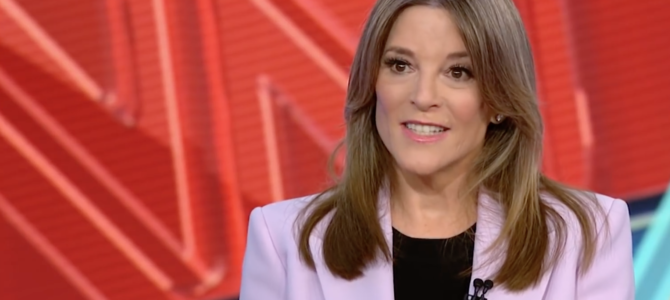Marianne Williamson ends her campaign for the Democratic nomination never having really been taken seriously as a candidate. There were, to be sure, some moments that gave Beltway observers pause, having just lived through the unlikely whirlwind of 2016. But Williamson, we now know definitively, is not the left’s answer to Donald Trump, despite her decades of massive success in the self-help industry. (Although, like Trump, she frequently tempts journalists into revealing patronizing attitudes.)
That background, however, did make her an interesting candidate. She was skeptical of the Democratic establishment, and flared memorably in debates—sometimes for surprisingly compelling answers, but most often for bizarre ones. That was her candidacy in a nutshell, one part compelling, three parts bizarre. She is clearly not qualified to be president.
Yet, despite Williamson’s failure to catch much traction in the race, she leaves Democrats with at least one serious lesson to internalize. It was best conveyed in conversation with Ross Douthat last August, when Williamson sharply criticized the “over-secularization of the Democratic Party,” particularly in contrast with other moments in history: (Emphasis added.)
I grew up, once again, in a time when things were different than this. Bobby Kennedy talked about the soul of America, Martin Luther King talking about political issues within a larger spiritual context. It’s only been in the last few decades that Democratic and progressive politics has become so overly secularized and so overly corporatized. This is an aberration in my mind. And I’m enough of a student of American history to know that. Franklin Roosevelt said a prayer on the radio as soon as the D-Day invasion began. Look at the second inaugural address of Abraham Lincoln. He contextualized the entire Civil War in terms of what it represented spiritually and was quoting from the Bible and so forth. I believe that the over-secularization of the Democratic Party has not served it. And I don’t believe that it has served the Democratic Party to make people of faith feel so diminished sometimes. I feel it myself in this campaign.
They aren’t openly Democrats, but a group of Never Trump operatives proved Williamson’s point in a video they released Thursday that poked clumsily at the president’s Christian supporters. To borrow her language, it does not serve the political opponents of religious voters to diminish them, or laugh them out of their movements. That’s true even considering the country today is more secular as a whole than it was in the eras Williamson mentioned. Religious voters are still a robust enough bloc to matter.
Williamson, of course, was genuinely funny at various moments in her candidacy, and not always on purpose. But at the core of her success outside politics is something very serious, a deep thirst for spiritual meaning shared widely enough to sell a whole lot of books.
Her effort to import that into electoral politics did not work. But the experience did bring Williamson to the wise observation that today’s Democrats are secular in ways even the party’s prior champions were not, and in ways that hamper their ability to appeal as broadly as possible too.









